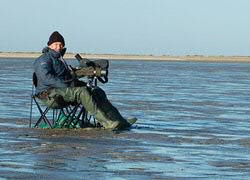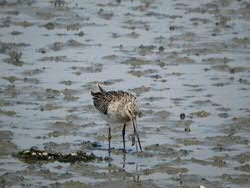Bar-tailed godwits concentrate in Wadden Sea while their number decreases

Even though the number of bar-tailed godwits in the Dutch Wadden Sea has been on the increase since 1990, their numbers have been substantially decreasing along the entire East Atlantic flyway. ‘It seems there is a shift taking place and they are moving to the Dutch Wadden Sea,’ says ecologist Sjoerd Duijns from NIOZ Royal Netherlands Institute for Sea Research. He is defending his PhD thesis on this subject at the University of Groningen on Monday 22 December.
The bar-tailed godwit is a migratory bird that winters both in Africa and in the Wadden Sea and breeds in Northern Scandinavia and Siberia. Their numbers along the East Atlantic flyway are decreasing. Fewer birds are sighted not just along the African coast but also closer to home in Denmark, Germany and the UK. It is the ‘buffer effect’ that makes their numbers increase in the Dutch Wadden Sea. Mr. Duijns says: ‘When the number of bar-tailed godwits increased, they first filled the eastern part of the Wadden Sea and subsequently the western part. This means that bar-tailed godwits prefer the eastern Wadden Sea. The mudflats in the eastern Wadden Sea contain more worms, but the risk of encountering birds of prey, such as the peregrine falcon, is higher there as well.’
Salt extraction
Yet, the availability of food is of relatively great importance. Mr Duijns is therefore very concerned about the licence recently issued for salt extraction under the western part of the Wadden Sea. Salt extraction may cause subsidence and as a consequence, bar-tailed godwits and other waders in the western part may not be able to reach their food anymore.

Mr Duijns stresses that large local wader populations do not necessarily mean that the quality of the habitat is high or that the species as a whole is doing well. ‘Large numbers of bar-tailed godwits in the Dutch Wadden Sea do not automatically mean that the population is doing well. That is why it is so important to gain a better insight into the reason why wader populations, such as that of the bar-tailed godwits, are decreasing. And we need to look beyond our borders to find out.’
The decreasing number in countries other than the Netherlands suggests that the quality of the habitats abroad is declining, but there is little evidence available as the countries around us do not yet have a full-scale food sampling programme, such as the SIBES programme in the Netherlands.
Curriculum vitae
Sjoerd Duijns (Breda, 1976) studied Forest and Nature Conservation at Wageningen University. He conducted his PhD research at the Marine Ecology Department of the NIOZ Royal Netherlands Institute for Sea Research on the island of Texel. His PhD research was funded by the Wadden Fund (Metawad project) and the Netherlands Organisation for Scientific Research (NWO).
Source: press release NIOZ
| Last modified: | 19 March 2020 1.43 p.m. |
More news
-
03 April 2025
IMChip and MimeCure in top 10 of the national Academic Startup Competition
Prof. Tamalika Banerjee’s startup IMChip and Prof. Erik Frijlink and Dr. Luke van der Koog’s startup MimeCure have made it into the top 10 of the national Academic Startup Competition.
-
01 April 2025
NSC’s electoral reform plan may have unwanted consequences
The new voting system, proposed by minister Uitermark, could jeopardize the fundamental principle of proportional representation, says Davide Grossi, Professor of Collective Decision Making and Computation at the University of Groningen
-
01 April 2025
'Diversity leads to better science'
In addition to her biological research on ageing, Hannah Dugdale also studies disparities relating to diversity in science. Thanks to the latter, she is one of the two 2024 laureates of the Athena Award, an NWO prize for successful and inspiring...
